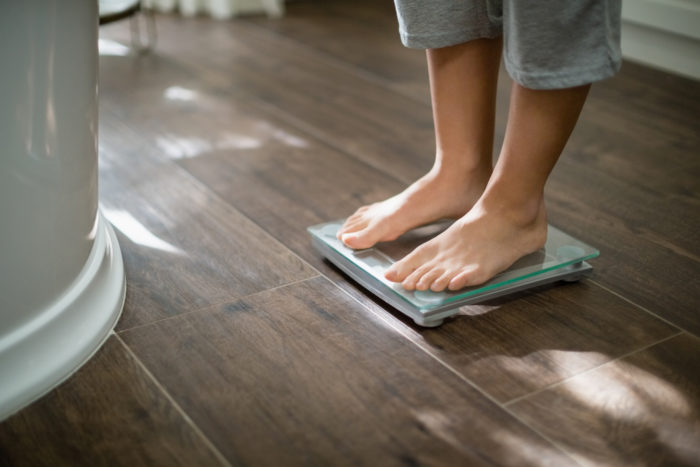Can stress really affect your ability to lose body fat? Keep reading to learn the science behind this phenomenon and how you can dial down your stress levels to boost your fat loss!
Losing weight is hard. There are so many factors that go into whether your new diet and workout regimen will result in consistent weight loss. Which is why so many people fail to lose weight or keep it off.
Some of the factors that affect weight loss like genetics, hormones, and your age are largely out of your control. But you do have control over many other factors like your sleep, physical activity, and yes… even your stress levels.
Stress is one of the most underrated factors that can have a huge impact on your ability to lose weight.
When you’re chronically stressed, this can negatively impact your fat loss goals because of how it affects your behavior.
But stress can also cause a problematic hormonal cascade throughout your body. One that impacts your hormones, sleep, and mood, which can also result in an inability to lose weight.
So if you’re not losing weight, despite doing what seems like everything right, this article is for you.
Here’s what you’ll learn:
- How to identify and eliminate stressors in your life
- The difference between chronic and acute stress when it comes to fat loss
- How stress affects your ability to lose weight
- How to decrease your stress and start losing weight again
If you’re ready to get back to hitting your fat loss goals and reducing your stress, keep reading!

What is Stress?
In it’s most basic definition, stress is how your body responds to any demand or threat.
When your body perceives something as a threat, your pulse quickens, you breathe faster, your muscles tense, and your brain uses more oxygen. This response is known as a “fight-or-flight” reaction and in human history was very useful for running away from predators or fighting off an attacker.
But in the 21st century when “predators” (i.e. stressful situations) are knocking on our door every waking moment, this response can get kicked into overdrive.
Everything from waking up to an alarm clock to planning an extended family vacation can be stressful.
And much like a bucket filling with water, the more stress you are under, the more likely it is to cause a problem with your health.
When your stress bucket is relatively empty, these day-to-day stressors likely won’t have a negative impact on your health.
But, as your stress bucket fills, stressors are more likely to affect your wellbeing.
With stress, it’s often a two-way street. Lack of sleep can be both a mental and physical stressor. But that stress from not getting enough sleep can, you guessed it, make it difficult for you to fall asleep.
It’s a vicious cycle that many people struggle with. I know I’ve been there before!
Our Body’s Stress Response
Our body responds to stress with surges in cortisol and adrenaline. These hormones ramp up processes that enhance our “fight-or-flight” response and down-regulate other non-essential ones.
Stress and our body’s response to it can get us caught in a downward spiral that’s hard to get out of.
And if you’re stuck in this stressor and stress response cycle while trying to pursue a fat loss goal, that could be the main reason why you’re not seeing any progress.

How to Identify Your Stressors
The sneaky thing about stress is that it isn’t always obvious what’s causing it… and therefore it’s hard to identify what’s derailing your fat loss goals.
Stress does come in the more obvious forms of a deadline at work, misbehaving kids, or a chronic illness.
But stress that impacts your ability to lose weight can also look like a daily caffeine habit, too much strenuous exercise, or even your evening commute.
Not to mention, stress can come from the best things in life, like planning a wedding, becoming a parent, or running your own business. And we hate to admit it when something we want is the biggest cause of stress in our lives.
What’s stressing you out isn’t always apparent. And those hidden, more subtle stressors could be what’s sabotaging your weight loss goals.
Anything that raises your cortisol levels, whether you feel it mentally or not, can impact your ability to lose weight.
If you’re struggling in your fat loss journey, it’s important to identify any areas that could be causing stress.
Here are some general categories that stressors usually fall into. Use this as a starting point to flesh out anything in your life that could be causing you stress.
- Emotional stress
- Physical stress
- Chemical stress
- Social stress
- Family stress
- Work stress
- Decision stress
- Isolation stress (thanks COVID-19!)
Once you’ve identified the major stressors in your life you can work to either eliminate them entirely or reduce their influence.
This will take some time and dedicated effort on your part. But if those stressors are getting in the way of your ability to lose weight, it’s worth putting in the extra effort.
Plus when you de-stress your life, you’ll likely see an improvement in all areas of your health… not just your weight.

Chronic vs Acute Stress and Fat Loss
I can’t talk about how stress affects fat loss without looking at the difference between chronic and acute stressors.
Whether you’re under chronic or acute stress can make a big difference in your ability to lose weight.
Chronic stress results from long term exposure to stressors that leads to the release of stress hormones. Acute stress is an immediate, often short-term, physical, mental, or psychological threat.
If an acute stressor persists for a long time or creates a trauma response, it can become a chronic stressor that alters our hormonal status.
Our body responds differently to chronic versus acute stress. This differing response in turn affects what will happen with our weight.
Chronic stress is more likely to lead to weight gain or difficulty losing weight. While acute stress is more likely to lead to weight loss and malnourishment.
When you’re under acute stress your brain directs resources away from normal body functions, like digestion. This, along with an increase in adrenaline, can keep you from feeling normal hunger pangs and cause you to undereat.
When stress is chronic, on the other hand, adrenaline’s appetite-suppressing effects wear off and cortisol starts to prompt the body to hold on to fat and replenish energy stores.

How Stress Affects Fat Loss
Although dealing with the mental and emotional ramifications of stress can be hard enough, it, unfortunately, doesn’t stop there.
There are also specific physiological factors caused by stress that can affect your body’s ability to lose weight.
Stress causes a cascade of chemical and hormonal changes in your body. These changes act as signals to your body letting it know it’s not safe.
And when you try to add on a weight loss goal, which can in itself be stressful, your chances for success can become pretty slim.
Here are a few ways that stress can impact your ability to lose body fat.
Would you like to save this post?
Your email address is 100% safe and will never be sent spam.

Stress Impacts Hunger Signaling
Stress – especially the chronic kind – can impact how your body signals to your brain that it’s hungry.
Ghrelin, an appetite enhancer, and leptin, an appetite suppressant, work together to regulate your hunger signals.
But prolonged stress can lead to hormonal changes that increase appetite. An increase in cortisol under stress stimulates ghrelin and reduces the sensitivity of leptin.
When this happens, you can feel hungry when you aren’t actually hungry at all. Stress eating is a real physiological response to an increase in cortisol. It’s not all in your head!
And if your stress lasts over a long period of time, your body can become resistant to leptin. With leptin resistance, your brain has a difficult time recognizing that your body is pumping out the leptin in an attempt to curb your hunger.
Without recognition of this hormone, you’ll be hungry and likely to eat more, leading to weight gain.
If you look at it from a hormonal standpoint, losing weight while you’re stressed is a nearly insurmountable task!
Your body is going to be working against your best efforts to shed fat, no matter how hard you try. And pushing yourself to lose weight by training and cutting calories typically just adds to your stress levels.

Stress Encourages Body Fat Accumulation
Holding onto body fat is one of our body’s best defense mechanisms against stress.
When our ancestors experienced stress, it was likely because they were actually in a life-threatening situation. Maybe they had to run and hide from a wild animal, or maybe there was a food shortage during the winter.
In these scenarios, holding onto body fat was necessary and beneficial for survival.
In modern society, we’re under constant stress. But not typically the kind of stress that threatens our lives or our access to food. This makes that same survival mechanism not as helpful as it once was.
Several studies have examined the relationship between high cortisol levels and an increase in abdominal fat.
Visceral fat contains a specific enzyme that converts inactive cortisone into active cortisol.
Stress increases your chances of holding onto fat in your abdomen. But having more belly fat also increases your cortisol levels.
This makes the stress and fat accumulation a cycle that’s hard to break. And trying to lose weight while you’re stressed may only make it worse.

Stress Alters Your Metabolism
Stress can also impact your body’s metabolism, making even the most moderate fat loss goals more difficult to reach.
The release of cortisol, especially when it’s chronic, changes the way your body metabolizes glucose.
And when your body is unable to efficiently process the glucose (carbs) that you eat, you can become insulin resistant.
Insulin resistance is a big contributor to weight loss resistance.
So when you’re stressed and experiencing blood sugar irregularities, your body is likely also holding onto the extra fat you’re trying to lose.
Chronic stress also pushes your body to produce a stress-related protein called betatrophin.
Betatrophin slows fat metabolism. This makes it more difficult for your body to break down its fat stores and for you to lose weight.
Stress is often at the root of sluggish metabolism and your inability to reach your fat loss goals. And trying to lose weight while you’re stressed often leads to nothing but frustration and unfortunately… more stress.

Tips for Lowering Stress and Increasing Fat Loss
It should be clear by now that your stress levels and your ability to lose extra body fat are intimately connected.
When you try to push towards a fat loss goal while you’re under chronic unmanaged stress, all you’re doing working against your body and adding to your stress.
If you’re chronically stressed, lowering your stress levels will be the single most beneficial thing you do to help make sustainable weight loss possible.
But reducing our stress is often easier said than done. And you can’t expect your stress, especially if it’s baked into your lifestyle, to disappear overnight.
Working to reduce your stress and decrease your cortisol levels is just that, work. It will take a conscious effort each day to make choices that lower your stress, not add to it.
Here are some simple ways to get started lowering your stress levels.
Let it go
At the risk of getting Frozen songs stuck in your head, sometimes our worst stressors are ones that we have complete control over. Whether that’s an overly busy schedule or toxic relationships, many things that stress us out on an ongoing basis are things that we could remove from our lives if we chose to do so.
I’m not saying it’s easy. There are so many things our modern society deems “normal” that are actually horrendous for our stress levels. Things like working 50+ hour weeks, watching the overly negative news every evening, constantly trying to climb the corporate ladder, believing our house has to be spotless, and committing to social events we wanted to say no to. But in order to remove as much stress from your life as possible, you have to be willing to assess the decisions you make on a daily basis and how they’re affecting your stress regularly.
Maybe that means you need to pull your kid off the soccer team, turn down a promotion, or walk away from a toxic friendship. These things aren’t easy to do, but you must realize the power you have in making choices that add to or take away from your stress.
Let go of the things that aren’t serving you or your family. I promise you’ll be glad you did!
Exercise Regularly
Exercising regularly is one of the best ways to reduce cortisol levels. Gentle aerobic exercise, like walking, swimming, and jogging are especially beneficial for lowering cortisol and increasing endorphins.
Regular exercise is also essential for sustainable weight loss. So while you’re working to lower your stress levels you might find that you drop a few pounds in the process. Just don’t let your exercise become too strenuous, which can have the opposite effect on your stress levels.
Get Enough Sleep
Sleep deprivation is a huge stressor on our bodies. Your cortisol can rise one day after slight sleep deprivation. Getting 7-9 hours of quality sleep a night is key to reducing stress and achieving fat loss.
To make this happen you might need to institute a strict bedtime, turn off your phone a few hours before you go to sleep, and focus on relaxing before bed. If you’re like me and you’re using your phone a lot more lately, try making your bed a “no-phone-zone” for a week and see how much better you sleep those nights!
Eat Real Food
Inflammatory foods are often sources of systemic inflammation and chronic stress. Switching your diet to one filled with real foods can help lower your stress burden.
Avoiding or at least reducing most processed foods (especially refined grains and sugars) and filling your plate with healthy cooking oils, fresh meats, and lots of veggies and leafy greens is a great way to fuel your body well to help encourage cortisol reduction and weight loss. Drink water instead of sodas or juices. Minimize your alcohol consumption or avoid it entirely. These are all simple tweaks that can help reduce physical stress in your body and help you lose extra body fat without having to count calories or macros.
The Bottom Line on Stress and Fat Loss
Stress, especially the chronic kind, can put a real damper on your ability to achieve your fat loss goals.
When you’re stressed, your hunger cues are off, your body holds onto fat, and your metabolism shifts – all factors that can make weight loss nearly impossible.
Working to reduce your stress levels before you attempt to lose weight is key. Dieting and exercise are often stressors in of themselves. And if you attempt to add those to an already overflowing stress bucket, your body won’t respond kindly.
Now it’s your turn, have you noticed that it’s more difficult to lose weight while you’re stressed? What were some effective ways that you’ve used to reduce your stress levels? Share your thoughts in the comments below!
This post may contain affiliate links. If you click on a link and make a purchase, I may receive a small commission.

+ show Comments
- Hide Comments
add a comment